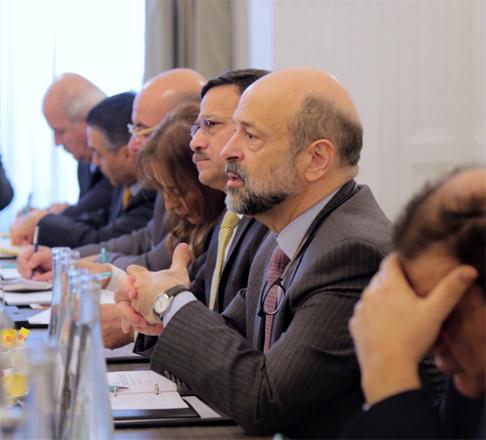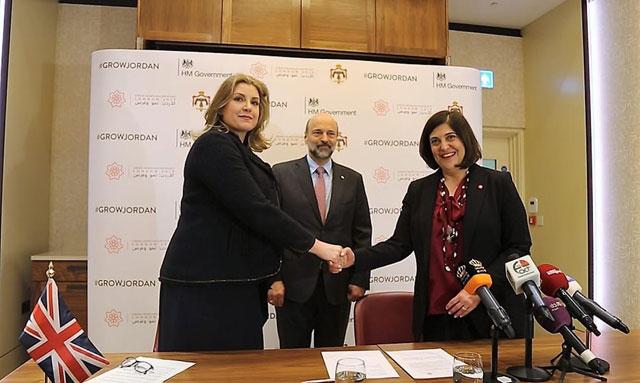You are here
Razzaz briefs investment funds on progress in economic reform
By JT - Feb 27,2019 - Last updated at Feb 27,2019

Prime Minister Omar Razzaz meets with representatives of investment funds specialised in investing in bonds of developing countries’ markets in London on Wednesday (Photo courtesy of Prime Ministry)
AMMAN — Prime Minister Omar Razzaz on Wednesday in London met with representatives of investment funds specialised in investing in bonds of developing countries’ markets.
During the meeting, which was attended by Finance Minister Ezzeddine Kanakrieh, Minister of State for Media Affairs Jumana Ghunaimat and Governor of the Central Bank of Jordan Ziad Fariz, Razzaz reviewed the economic and financial structural reform that Jordan has recently implemented, the Jordan News Agency, Petra, reported.
The prime minister expressed his appreciation for these funds’ confidence in investing in the Kingdom, referring to the bundle of procedures and laws that the government has executed to stimulate the business environment and attract more investments.
The premier stressed that the London initiative, which will be co-hosted by the UK and Jordan on Thursday, constitutes an opportunity for the government to showcase its new vision on the future of the Jordanian economy and priorities, which include boosting economic growth, creating new jobs and attracting local and foreign investments.
The initiative, which is expected to witness the participation of representatives from 60 countries and international organisations and institutions, carries significant political indicators that reflect the world’s interest in the Kingdom and its role as a key factor of regional stability, Razzaz pointed out.
The London initiative is an international recognition and appreciation for the importance of supporting Jordan and assisting it after the country implemented economic and financial structural reforms, the premier added, noting that the government is working with the World Bank to develop a five-year plan for economic growth and creating jobs.
He said that the government is intensifying its regional efforts to increase exports, boost trade, take advantage of the Kingdom’s geographical location as a hub and gateway for reconstruction in neighbouring countries and benefit from free trade agreements connecting Jordan to several countries and economic blocs.
During a dialogue session, Razzaz answered questions and inquiries by the funds’ representatives, referring to the government’s efforts with Iraq to reopen borders and reach important agreements that can play a role in restoring the high level of commercial and economic exchange.
Jordan’s exports to Iraq used to reach an annual $1 billion, but declined to some $300 million due to difficult conditions in the neighbouring country in the past years, the premier said, stressing that the trade movement and export figures have started increasing after the recent agreements between Amman and Baghdad.
As for the London Initiative, Razzaz said that Jordan does not look at the event as the end result, rather the Kingdom considers it a beginning of future efforts that will continue to boost the Jordanian economy and empower it to face challenges, according to Petra.
He noted that Thursday’s conference is different from the previous London conference, which mainly addressed support to countries hosting Syrian refugees.
Replying to a question on the general debt, the prime minister said that the government has embarked on implementing procedures to address the debt issue, which currently stands at 94 per cent of the GDP.
In this regard, he noted that the debts of the National Electric Power Company NEPCO) alone, which were mainly the result of high production costs that followed the halt in Egyptian gas supplies for several years, stood at some JD5.5 billion.
Addressing the high levels of debt of NEPCO and the Water Authority of Jordan and finding solutions to reduce them will be part of the government’s future discussions, he noted.
For his part, Kanakrieh said that the economic and financial structural reform programme that Jordan implemented in cooperation with the International Monetary Fund aimed at increasing self-reliance and ensuring that local revenues cover current expenditures and a large proportion of capital spending.
The minister stressed that the government reform procedures aim at reducing the debt-to-GDP ratio from its current level to less than 80 per cent in the next five years, “not through imposing more taxes or reducing expenditures, which have been declined to its minimum level, but through enhancing the economic growth”.
Related Articles
LONDON — Jordan’s reforms, investment potential and vision for creating jobs and driving economic growth will be highlighted during Thursday
AMMAN — The European Bank for Reconstruction and Development (EBRD) on Tuesday signed a multiyear $265-million loan agreement with the Natio
AMMAN — The government on Friday outlined all the agreements and memoranda of understanding it signed at the London initiative, co-organised

















